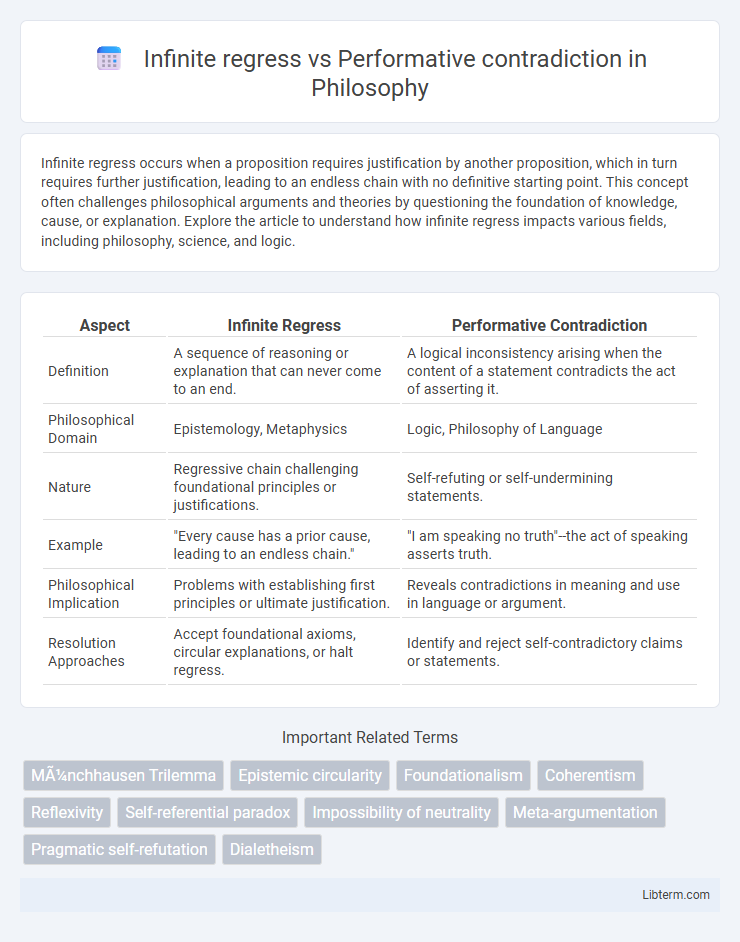Infinite regress occurs when a proposition requires justification by another proposition, which in turn requires further justification, leading to an endless chain with no definitive starting point. This concept often challenges philosophical arguments and theories by questioning the foundation of knowledge, cause, or explanation. Explore the article to understand how infinite regress impacts various fields, including philosophy, science, and logic.
Table of Comparison
| Aspect | Infinite Regress | Performative Contradiction |
|---|---|---|
| Definition | A sequence of reasoning or explanation that can never come to an end. | A logical inconsistency arising when the content of a statement contradicts the act of asserting it. |
| Philosophical Domain | Epistemology, Metaphysics | Logic, Philosophy of Language |
| Nature | Regressive chain challenging foundational principles or justifications. | Self-refuting or self-undermining statements. |
| Example | "Every cause has a prior cause, leading to an endless chain." | "I am speaking no truth"--the act of speaking asserts truth. |
| Philosophical Implication | Problems with establishing first principles or ultimate justification. | Reveals contradictions in meaning and use in language or argument. |
| Resolution Approaches | Accept foundational axioms, circular explanations, or halt regress. | Identify and reject self-contradictory claims or statements. |
Understanding Infinite Regress: Definition and Examples
Infinite regress occurs when a proposition or argument requires a justification that leads to an endless chain of reasoning without a foundational starting point, making the argument logically unsound. For example, in epistemology, the need to justify every belief by another belief ad infinitum exemplifies infinite regress, questioning the possibility of certain knowledge. Understanding this concept helps distinguish it from a performative contradiction, where an assertion contradicts the act of asserting itself rather than causing an endless justificatory loop.
What is Performative Contradiction? Key Concepts
Performative contradiction occurs when the act of making a statement undermines the truth or coherence of the statement itself, revealing an inherent inconsistency. Key concepts include self-refutation, where the content contradicts the act of assertion, and a failure in pragmatic logic, highlighting the tension between expression and meaning. This differs from infinite regress, which involves an endless chain of reasoning without a foundational stopping point.
Philosophical Origins: Infinite Regress in Thought
Infinite regress in philosophy originates from ancient Greek skepticism, particularly within the works of Socrates and Aristotle, where it highlights problems in justifying knowledge claims through endless causal chains. This concept questions the foundation of reasoning by demonstrating how every premise requires a prior justification, leading to an unresolvable sequence. In contrast, performative contradiction arises from linguistic philosophy, notably explored by J.L. Austin and later philosophers, emphasizing self-defeating speech acts rather than infinite explanatory demands.
The Mechanics Behind Performative Contradiction
Performative contradiction occurs when the act of asserting a statement undermines the statement itself, revealing an inherent logical conflict in the speaker's action and claim. This contrasts with infinite regress, where arguments loop endlessly without resolution. The mechanics behind performative contradiction involve the pragmatic layer of language use, where the speaker's performance--such as denying the possibility of knowledge while engaging in discourse--invalidates their own position by contradiction in practice.
Infinite Regress in Epistemology and Logic
Infinite regress in epistemology arises when the justification for any belief requires an endless chain of supporting reasons, challenging the possibility of obtaining certain knowledge. This problem highlights the difficulty of foundational beliefs because each justification depends on a prior one, preventing a final, self-evident premise. In logic, infinite regress underscores issues in argument structure, where premises continuously rely on further premises without reaching a conclusive foundation.
Real-World Cases of Performative Contradiction
Real-world cases of performative contradiction often arise in legal and political discourse where a speaker's assertion negates the presuppositions required to make that assertion meaningful, such as denying the possibility of truth while insisting on the truth of a claim. Unlike infinite regress, which involves an endless chain of reasoning or justification with no foundational endpoint, performative contradiction exposes inherent conflicts within a statement's performative act itself, effectively undermining its validity. Examples include a judge asserting impartiality while demonstrating bias or a philosopher claiming that all knowledge is impossible while engaging in rational argumentation, illustrating how performative contradiction invalidates the speaker's position in practical contexts.
Comparing Infinite Regress and Performative Contradiction
Infinite regress occurs when a proposition requires justification through an endless chain of reasoning, making it impossible to reach a conclusive foundation. Performative contradiction arises when the act of asserting a statement undermines the statement itself, exposing a fundamental inconsistency in the performer's position. While infinite regress deals with the logical structure and necessity of premises, performative contradiction focuses on the self-defeating nature of language acts within philosophical arguments.
Implications for Philosophical Argumentation
Infinite regress challenges the foundation of philosophical arguments by exposing the need for a stopping point, or a fundamental premise, to avoid endless justification. Performative contradiction reveals self-defeating statements within arguments, undermining their validity by showing that the act of asserting them contradicts their content. Both concepts emphasize the importance of consistency and foundational assumptions in constructing sound philosophical arguments.
Resolving Infinite Regress vs Addressing Performative Contradictions
Resolving infinite regress involves identifying a foundational premise or self-evident truth to halt the endless chain of reasoning, ensuring a coherent justification system. Addressing performative contradictions requires demonstrating that the act of asserting a statement inherently contradicts its content, thereby invalidating the assertion. Both strategies aim to stabilize logical discourse by either grounding reasoning or exposing inherent self-defeating claims.
Conclusion: Significance in Modern Philosophy
Infinite regress challenges foundational assumptions by exposing endless chains of justification, undermining epistemic certainty. Performative contradiction reveals flaws when a statement negates the conditions of its own expression, highlighting inherent self-refutation in some philosophical claims. Both concepts critically shape modern philosophy by refining criteria for coherence, justification, and meaningful discourse.
Infinite regress Infographic

 libterm.com
libterm.com